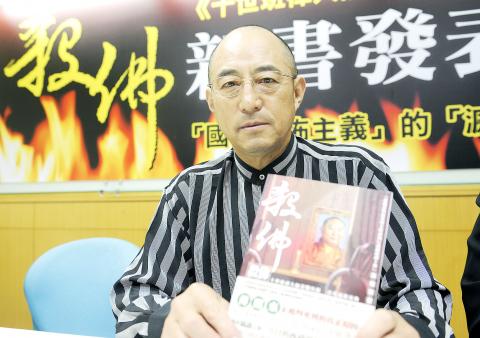The 10th Panchen Lama was murdered by former Chinese president Hu Jintao (胡錦濤) and former Chinese premier Wen Jiabao (溫家寶), a prominent Chinese dissident said in Taipei yesterday as he warned that Beijing’s cultural genocide in Tibet could serve an example for those Taiwanese who still have false expectations of China.
Citing the findings from his private interviews with Chinese and Tibetan officials, Yuan Hongbing (袁紅兵) told a press conference that the 10th Panchen Lama, Choekyi Gyaltsen, was poisoned to death in January 1989 rather than dying from a heart attack as the Chinese Communist Party (CCP) claimed.
Yuan, a Chinese writer who sought political asylum in Australia in 2004, detailed the findings in a book he co-wrote with Tibetan author Namloyak Dhungser titled Shafo (殺佛) — killing a Buddha — which has since been published in Taiwan.

Photo: George Tsorng, Taipei Times
The assassination was plotted by former Chinese presidents Deng Xiaoping (鄧小平) and Li Xiannian (李先念), and Bo Yibo (薄一波), father of disgraced Chinese official Bo Xilai (薄熙來), and he was executed by Hu and Wen, said Yuan, who first revealed the allegation in 2011.
However, the reason Taiwanese should pay attention to Tibet is far more than the Panchen Lama’s death, he said, as they should understand that Beijing’s cultural genocide spanning several decades had caused the death of 1.2 million Tibetans and at least 126 cases of self-immolation in recent years.
“I would say that Tibet is far away and close to Taiwan at the same time, because what happened and is happening in Tibet could happen in Taiwan in the future,” Yuan said. “When President Ma Ying-jeou (馬英九) suggested that the cross-strait flights are domestic flights, that told you how close Taiwan could be to becoming the next Tibet.”
The signing of a peace agreement with Beijing in 1951 and the retreat from being an independent country to an autonomous region had both failed to bring Tibetans the peace and religious freedom they deserve, Yuan said, and the CCP was never serious about keeping its promises.
“[Beijing] has never stopped oppressing the Tibetan people in the past six decades. When you realize that, I don’t know what expectations Taiwanese could have of the CCP,” Yuan said.
National Taiwan University Hospital physician Ko Wen-je (柯文哲), who is mulling running in the Taipei mayoral election next year, said Yuan’s book was a reminder to Taiwanese about what they could learn from Tibet.
“It is also important for Beijing to understand that what happened in Tibet was why most Taiwanese still have doubts about China’s ‘peaceful unification’ pledge. Past experiences show that the CCP has not been trustworthy,” Ko said.

An essay competition jointly organized by a local writing society and a publisher affiliated with the Chinese Communist Party (CCP) might have contravened the Act Governing Relations Between the People of the Taiwan Area and the Mainland Area (臺灣地區與大陸地區人民關係條例), the Mainland Affairs Council (MAC) said on Thursday. “In this case, the partner organization is clearly an agency under the CCP’s Fujian Provincial Committee,” MAC Deputy Minister and spokesperson Liang Wen-chieh (梁文傑) said at a news briefing in Taipei. “It also involves bringing Taiwanese students to China with all-expenses-paid arrangements to attend award ceremonies and camps,” Liang said. Those two “characteristics” are typically sufficient

A magnitude 5.9 earthquake that struck about 33km off the coast of Hualien City was the "main shock" in a series of quakes in the area, with aftershocks expected over the next three days, the Central Weather Administration (CWA) said yesterday. Prior to the magnitude 5.9 quake shaking most of Taiwan at 6:53pm yesterday, six other earthquakes stronger than a magnitude of 4, starting with a magnitude 5.5 quake at 6:09pm, occurred in the area. CWA Seismological Center Director Wu Chien-fu (吳健富) confirmed that the quakes were all part of the same series and that the magnitude 5.5 temblor was

The brilliant blue waters, thick foliage and bucolic atmosphere on this seemingly idyllic archipelago deep in the Pacific Ocean belie the key role it now plays in a titanic geopolitical struggle. Palau is again on the front line as China, and the US and its allies prepare their forces in an intensifying contest for control over the Asia-Pacific region. The democratic nation of just 17,000 people hosts US-controlled airstrips and soon-to-be-completed radar installations that the US military describes as “critical” to monitoring vast swathes of water and airspace. It is also a key piece of the second island chain, a string of

The Central Weather Administration has issued a heat alert for southeastern Taiwan, warning of temperatures as high as 36°C today, while alerting some coastal areas of strong winds later in the day. Kaohsiung’s Neimen District (內門) and Pingtung County’s Neipu Township (內埔) are under an orange heat alert, which warns of temperatures as high as 36°C for three consecutive days, the CWA said, citing southwest winds. The heat would also extend to Tainan’s Nansi (楠西) and Yujing (玉井) districts, as well as Pingtung’s Gaoshu (高樹), Yanpu (鹽埔) and Majia (瑪家) townships, it said, forecasting highs of up to 36°C in those areas